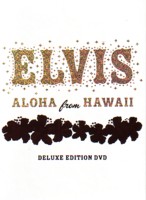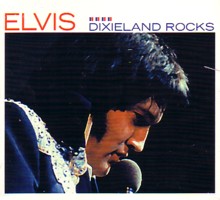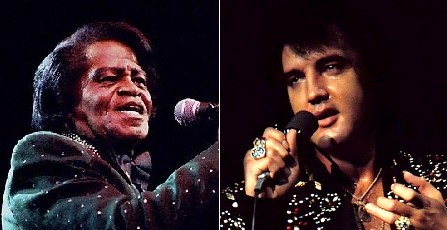James Brown 'The Godfather of Soul' died on Christmas Day 2006, aged 73.
What Elvis Presley was to Rock 'n' Roll, James Brown was to Soul and R&B.
Elvis was "The King of Rock and Roll", James Brown was "The Godfather of Soul" - and both superstars changed our musical world forever.
James Brown was so moved by Elvis' death that he requested, and was allowed, time alone with Elvis as he lay in his coffin at Graceland. James Brown was also the first entertainer to arrive at Elvis' funeral.
James Brown said of Elvis,
"I wasn’t just a fan, I was his brother. Last time I saw Elvis alive was at Graceland. We sang ‘Old Blind Barnabus’ together, a gospel song. I love him and hope to see him in heaven. There’ll never be another like that soul brother."
There were many similarities to Elvis' and James Brown's lives and over the years they were friends. Both Elvis and James Brown were born in impoverished circumstances in Southern USA absorbing their musical influences from the cotton picking and farming lands around them. They both hit the ‘big time’ in 1956 and both had major chart "comebacks" in early sixties pre-Beatles. James Brown even appeared in a lightweight sixties film 'Ski Party.'
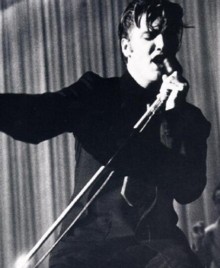 |
Elvis and James Brown in 1956. They knew how to work the mic. |
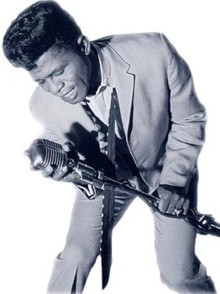 |
After The Beatles arrived both Elvis and James Brown had "lean periods" chart-wise. However both then made sensational turn-arounds and the biggest hits of their careers with songs recorded in 1969, ‘Sex Machine’ & ‘Suspicious Minds’.
Both were politically affected by Martin Luther King’s murder, although obviously not to the same extent. James Brown began his dramatically political ‘I’m Black, I’m Proud’ period where Elvis was moved to release his most political musical statements in 'If I Can Dream' and ‘In The Ghetto’.
In a weird connection both stars had relationships with US president Richard Nixon. James Brown even played at his inaugural address.
So while many Elvis fans know only a little about James Brown, in many ways Brown was a spiritual kin to Elvis and understanding their careers is essential to comprehending the era they lived in, the music that they made and the lives they changed.
Fans shouldn't forget that Elvis did seem to truly admire James Brown. His record collection contained at least ‘It's a Man's Man's Man's World’.
According to many sources, Priscilla among them, Elvis was inspired to incorporate a cape into his live shows based on James' use of the prop.
Brown's words and devotion are not to be taken lightly as well. A man of fierce independence, he was not one to suffer a slight. Yet he never to my knowledge said an unkind word about Elvis. In fact, in his biography, Brown specifically praised Elvis and acknowledged their kinship. (See EIN spotlight - 'Elvis was not a racist') |
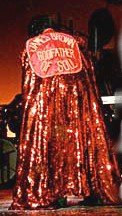 |
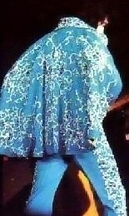 |
They showed similar characteristics elsewhere too. In an era where studio craft was defining rock and soul music, both Elvis and James preferred to record live in the studio with their bands. Interaction with their musicians and spontaneity were hugely important to both artists. Just as Elvis would call out to his musician by name on stage or in the studio, so would James. Much of their best music was made in the same style as well. Many times going into a studio James would not have a direct plan and would let what happened happen. Elvis would often do the same thing. Where James would extemporize some great new riff, Elvis would often troll through his vast knowledge of popular music and come up with some off the wall interpretation.
Their musical backgrounds were similar. Both had a deep love of Gospel and understanding of The Blues. They appreciated the music of Ivory Joe Hunter, Chuck Willis, both recorded Roy Brown's 'Good Rockin' Tonight' and Jesse Stone's 'Like A Baby'. Similarly both recorded versions of pop classics like 'Fever' and 'Mona Lisa' and also had an appreciation of Country & Western.
If you listen to their pioneering hit singles both Elvis' and Brown's records seem to explode out of their grooves in their excitement. And when you look at both artists at their live performance peaks (1969/1970) you witness a magical connection as they work their loving audiences to a delirious, explosive frenzy. Both performers would end up drenched in sweat, and both could rightly be described by Brown's moniker, "The Hardest-Working Man in Show Business."
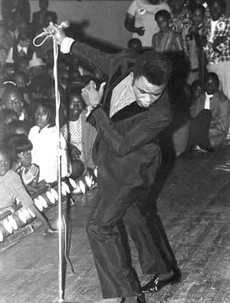 |
"The Hardest-Working Men in Show Business." |
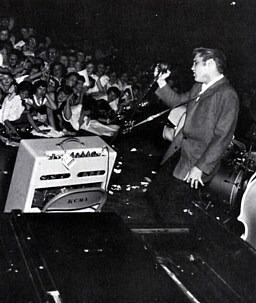 |
At their best, no one could follow either performer. As was mentioned in many of the James Brown obituaries, Mick Jagger made a fool of himself by attempting to one-up Brown at the legendary T.A.M.I Show. The show which at that time was considered the absolute best in-concert presentation of rock n' soul music was directed by Steve Binder who would eventually go on to do Elvis' 1968 television 'Comeback Special' that set an even greater standard.
Energy and spectacle were the keys to both men's performances. Both men learned how to manipulate their audience while leading their bands through their body movements.
Both men started out wearing suits on stage but graduated to more and more outlandish garb.
Ritual was a huge part of both shows. Later on fans would pay just to see Brown fake a stage faint and come back to life just as fans would come out to see Elvis' spectacular endings on stuff "Polk Salad Annie" or "Suspicious Minds" or earlier "Hound Dog". |
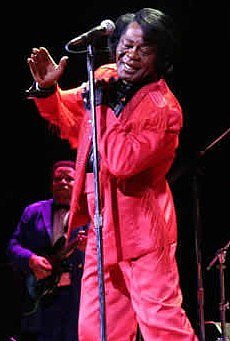 |
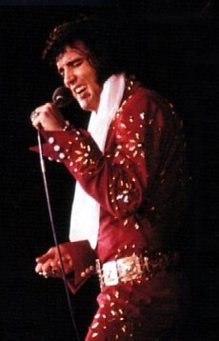 |
While leaders in their respective musical fields both also had a major passion for mainstream pop. Just as '50s Elvis fans cringe at the idea of Elvis singing "Are You Lonesome Tonight?" or "It's Now or Never", many Brown fans cringe at him singing "I Love You Porgy" or "These Foolish Things" or even his towering remake of "Prisoner of Love". And of course a track like "Prisoner of Love" or "Are You Lonesome Tonight?" shows that the unique artistic approach of an artist like Elvis or Brown can stand cliché on its head and create something personal and deeply moving out of these spare parts.
In their earlier poverty before rising to fame, Elvis and James Brown were as left out of American culture and life as anyone could be. Just as they craved money, power and the distance from their poverty that money and power afforded them, they also craved acceptance; they wanted a place in America. For them the pop of Dean Martin, Frank Sinatra, Perry Como, even Nat King Cole represented the height of popular success and acceptance. To be like Frank Sinatra was the American dream to them: that was the pinnacle of success as presented by the media of the time.
Eventually, arguably both Elvis and Brown eclipsed Sinatra in achieving a universal dominance that the chairmen of the board never really approached. Just as Elvis has never quite received proper credit for his appeal to black audiences, Brown has never quite gotten the recognition he deserved as an inspiration and success in the mainstream white market. Eventually however Brown would hit the pop chart in the US so often that he wound up with just under 100 singles on the chart. This is more than any other figure except for Elvis. More than the Beatles, more than Elton John. Of course James Brown was not overtly popular with white audiences as those artists, however he made significant in-roads and he mattered to white America. This is evidenced in the fact that like Elvis, Brown was eventually to command audiences with the president of the United States.
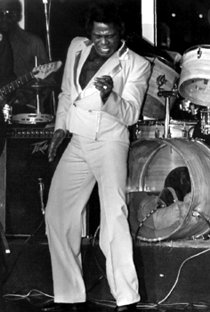 |
"Interaction with their musicians and spontaneity were hugely important to both artists. Just as Elvis would call out to his musician by name on stage, so would James" |
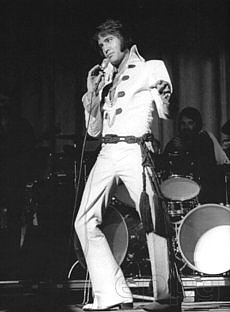 |
Bruce Springsteen is an interesting connection between both artists. Springsteen influences are listed as Dylan, Spector and Elvis yet he will be the first to tell you that James Brown is the primary influence on the style and structure of his concerts. Some would argue that Springsteen is the most important male performer to emerge in pop music in the past 35 years. Interestingly, the only real competitors are Prince and Michael Jackson who similarly were both influenced by Elvis and Brown.
That all these artists could even be considered mainstream is thanks to the in-roads that Elvis and Brown laid down. This is why when you take into consideration where they both started from, why Brown was so vocal in his love for Elvis' music. Brown writes in his book about how he felt a kinship with Elvis as their hit careers started at about the same time.
On a practical scale there was really no comparison. In 1956 Elvis had five #1 hit singles on just about every chart imaginable. Brown had one national hit in a specialized area that barely made a dent on the pop charts (despite reportedly selling a million copies). Yet Brown recognized the music that Elvis made as coming from the world where he was born.
Brown recognized that Elvis in looks, manner and appearance was not a Perry Como or a Pat Boone a product of a relatively privileged upbringing. If he heard Elvis' Sun tracks, he knew that Elvis had many of the same heroes including Roy Brown. He recognized that Elvis came from a group that outsiders called "white trash", a group that was almost as anathema to mainstream America as blacks. At the same time, this guy had conquered the world.
What's more Elvis conquered it by being who he was, not pretending to be something else. He had changed them. What's more Elvis was so steeped in true African-American culture that perhaps they were ready for more. The lines had shifted. What inspiration this must have been for a young performer like Brown just getting his first break. In 1956 he may not have been at Elvis' level yet but the very fact of Elvis' acceptance indicated a measure of success that Brown had not hereto realistically even dreamed of.
James Brown said..
"Elvis and I were friends for a long time, for twenty years. And he told me, he’d ride around Memphis around the streets he’d come up in, all alone at night. Ride around on his motorcycle when he was sure the rest of the world was asleep, just kind of hauntin’ them places he hung around in as a kid. He was a country boy."
James Brown death is devastating in the same way as Elvis Presley's in that he was such an iconic and important figure in our musical legacy that you feel that they could never die. Like author Dave Marsh said about Elvis, "you just picture living with them until your old age and sharing it with your grandchildren". However because the power of their music is so great, both of their spirits will never truly leave our world - but it's so sad when that living connection to history is no longer there.
James Brown was there for it all, the birth of rock 'n roll, the birth of soul, the birth of funk and inadvertently the birth of hip hop. He was a true giant and he will be sorely missed by everyone who loves popular music.
James Brown said, "I love Elvis and hope to see him in heaven. There’ll never be another like that soul brother."
The life defining power of their music will continue to inspire people and in that way they both will live forever.
Spotlight Co-written by Harley Payette & Piers Beagley
-Copyright EIN, January 2007
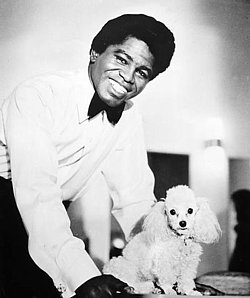 |
Fabulous final images showing the tender side of these astounding superstars. |
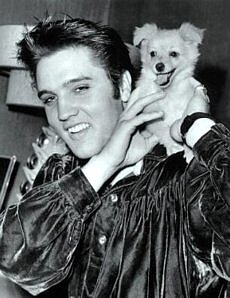 |
Click here for the James Brown website
Click here to comment on this EIN spotlight



